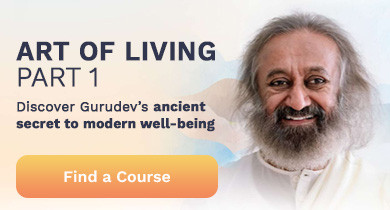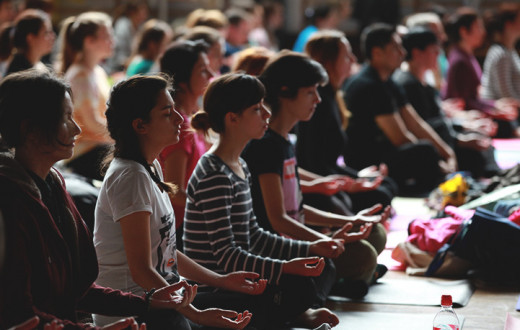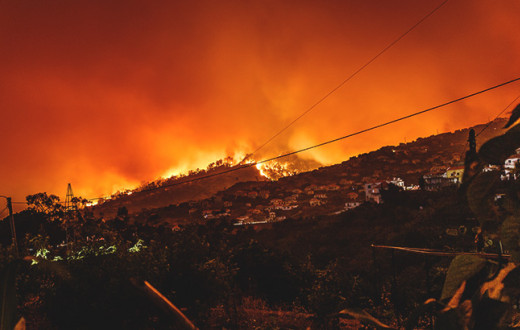By Elizabeth Herman | Posted: December 02, 2019
During Gurudev Sri Sri Ravi Shankar’s talk about Mediation and Meditation last week at the EU parliament, he touched on many specific trouble spots where he has personally played a role in moving resolutions of conflict forward. In addition to recounting how he helped to solve a dispute in his native India, he told stories about the South American countries of Colombia and Venezuela, two of the regions seeking peaceful solutions.
Gurudev narrated the circumstances in each of these challenging mediation tasks. You can see the talk in this video.
Colombian efforts for peace
Gurudev began his discussion of South America by saying, “I’d like to share my experience of a similar situation in Colombia. I received an honor from the president. After that, we had a 5 minute handshake meeting, but it lasted for an hour. In that meeting, the president expressed his concern about law and order. Every day the FARC rebels bombed and disrupted normal life.
Just a couple of days earlier they had blown away the television tower, and then the telecommunications towers, and then the water connection to the city was disrupted. So he said, ‘It looks like there is no other option than a military option. The U.S. and other countries have agreed, but it’s painful to take that option because nearly 40,000 lives will be affected.’
So, I said, ‘Why don’t I go to Cuba and try it out, talking to these people?’
He said, ‘Any kind of help is welcome,’ but he wasn’t very convinced that it would work.
So the next day, we took a chartered plane and a few Spanish speaking teachers of Art of Living, and my sister of course was with me, and we landed in Havana, Cuba. At first, the leaders were very reluctant to meet. They said, ‘Because we don’t believe in any religion or spirituality we won’t even meet. We believe in Marxist philosophy. So we’re not interested.’
But somehow, they ended up at Havana University that evening where I gave a talk and a session on meditation. Not the top leaders, but the second ring of leaders came. And that same night, they sent a message that they would like to meet with me the next day.
So, the next day, they were advising me, and they said, ‘You should go and talk to the government of Colombia and ask them to stop their atrocities on us.’
I heard them and said, ‘I know. You’re also the victims here. In this war, nobody’s the culprit. You and they are both victims.’ Then, we continued with our dialogue for the next 3 days, and had a few minutes of meditation each day. They loved and enjoyed the meditation. They listened afterwards and began to understand non-violence.
I told them, ‘I agree. You aren’t having fun in the forest being guerillas. You’re not having a party there. You’re fighting for survival; you’re fighting for a cause. All you want is social justice, right?’
They said, ‘Yes.’
I told them, ‘We are with you. I am with you. I tell you, the entire world will be with you, but only if you use non-violence. The means you’ve adopted to achieve your goals isn’t justified. You’re using violence, but you won’t achieve your goal that way. Why don’t you try Ghandian principles of non-violence? Just for once. For 53 years you’ve tried the other route and it hasn’t worked.’
Do you know what their response was? ‘It will be hypocritical to say we’ll now adopt non-violence. No, we can’t do that.’ I just smiled at them. I let them think on it.
But then, we went to the Indian embassy. They followed and we had a meditation session. The next morning, the same FARC leaders came on a press conference with me and unilaterally declared a ceasefire and said they will adopt the Ghandian principle of non-violence.
Now, when this news came, neither the Colombian government nor the press believed it because they thought this was too good and too simple to believe. It was a complicated issue. It must be their gimmick of reorganizing or their way of buying time. It can’t be true. This is what they concluded, but time spoke the truth.
A month later, they realized that those people kept their commitment to me, and a year later, they formed a political party and came to mainstream politics. They sent a note, saying, ‘As we promised you, we are starting a political party, and will fight for our rights through politics.'
Meditation changes our mindset from perceiving things from a stressed perspective, a stressed mind, to bringing more clarity in perception, observation, and expression. I think this is very important, to take a few moments to reflect, to meditate, to relax. You might have seen there are a number of published research papers showing the benefits of meditation, how it changes the structure of the brain and impacts the grey matter.
We can do a short meditation now and then open the floor for questions.”
A question on Venezuela
Another participant asked, “Do you think that Europe can help you in these efforts to bring peace to Venezuela?”
Gurudev reflected on his time visiting Venezuelan leaders, and responded, “In Venezuela there’s a very peculiar issue in that the opposition is not united. So if you have to transfer power from one side to another side, there has to be somebody there to take over. I was talking to Juan Guaido, and I asked him, ‘who do you think can manage other than Maduro? Who do you think can replace him?’ Do you know what he said?
He just smiled and said, ‘Jesus Christ.’ That means he said there isn’t one other person who could manage because Maduro holds 38% of the population there. The opposition isn’t united. Now, I would leave it to the European Parliament members, who are very wise and have many great ideas, to think about how they could contribute there.
Instead of telling somebody to just quit and run away from their country, why don’t they give the person a fair hearing and a respectable exit, I would say. The exit should be very respectful so that everybody feels safe. Just sanctions alone won’t help. They have helped to some degree. They’re necessary, to put pressure on, but if it continues for too long, the population will lose faith in their government.
If the general population loses faith in politics, then countries will plunge into uncontrollable chaos. No leaders will be able to do anything. It’s high time that the international community takes a look, prevents human suffering from going too far, quickly brings the parties together, and avoids this chaos of uncertainty. We should see that the general population doesn’t lose faith in the political system and doesn’t take the law into their own hands. This is important.”
You can read more about the first part of this talk in part 1 of this article.
Elizabeth Herman writes, offers writing support to clients, teaches, and volunteers for a better world. She has a PhD in Rhetoric, Composition and Literature. Find her on Facebook or Twitter.



















